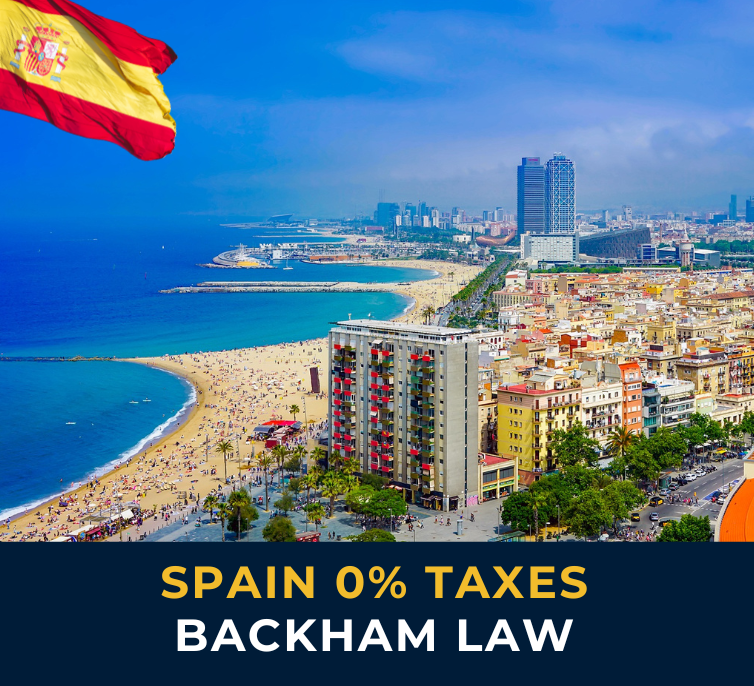Whether you are a foreign national considering living in Spain or a Spaniard who has been outside the country for more than 5 years…
The Beckham Law can be your great ally!
Since 2023, thanks to the Startup Law, Spain has become a solid option for those seeking tax advantages and low taxation in Europe.
The favorable changes to the Beckham Law (which we analyze in this article) have resulted in a paradoxical situation that combines the arrival in Spain of those interested in tax benefits with the departure of residents fleeing high tax pressure.
Currently, only 9,000 people benefit from the Beckham Law in Spain, which is why we are dedicating these lines to informing you about the advantages of a program that could be the perfect successor to Portugal’s famous NHR.
Taxation and benefits of the Beckham Law
Many people, due to the quality of life, consider living in Europe in general and in Spain in particular.
However, the country’s high tax pressure has for years acted as a natural deterrent to investments, large fortunes, and talent.
This seems to be changing radically with the improvements and facilities introduced to the Special Expatriate Tax Regime (Beckham Law), which since 2023 offers the following tax advantages:
- 6 years of tax benefits (year of arrival + 5 subsequent fiscal years).
- Total exemption from taxes on capital gains and dividends earned outside of Spain (i.e., zero tax on this kind of overseas income).
- No remittance conditions (the exemptions apply even if the income is brought into the country).
- Exemption from wealth tax on foreign assets.
- Exemption from declaring foreign assets through the 720 form.
- Flat income tax rate for worldwide employment income of 24% up to €600,000 and 47% for higher income.
- Extension of tax benefits to the spouse and children under 25 years old.
- Non-application of the CFC Rules under this regime.
- All years of residence in Spain under the Beckham Law count towards acquiring nationality.
Disadvantages of the Beckham Law
Although the disadvantages of the Special Impatriates Tax Regime (Beckham Law) are minor compared to its advantages, it is worth knowing them:
- Despite being considered a Spanish tax resident, you will not have access to Spain’s double taxation treaties.
- You must take into account social security contributions for your work performed in the country, as you will not be exempt from them. If a treaty exists, it may be possible to maintain social security in your home country.
- You will not be able to enjoy a tax-free allowance or deductions for expenses such as social security contributions, as you will be taxed as a non-resident.
- The years in Spain under the Beckham Law also count towards the exit tax.
- Without an employment contract (as a self-employed individual), it is only possible to access the Beckham Law by being approved by ENISA or as a highly qualified professional providing services to start-up companies. In this article, we explain how these routes to the Beckham Law work.
For reasons such as the exit tax or double taxation, it is advisable to review your situation with a professional to evaluate how the tax regime will affect your overall tax strategy.

What are the requirements of the Beckham Law in Spain?
You can apply for the Beckham Law if you have not been a tax resident in Spain for at least 5 fiscal years (full years), regardless of your nationality.
We want to emphasize a crucial requirement that many overlook due to ignorance:
YOU CAN ONLY APPLY WITHIN THE FIRST 6 MONTHS OF RESIDENCE
If you have been residing and registered with Social Security for more than 6 months, you will lose the right to apply, so you must plan and act swiftly.
With these 2 requirements clear, we can explore the five pathways to apply for the Beckham Law:
Employment Contract in Spain
The Beckham Law will be available to those who relocate their residence to Spain due to an employment contract, except for athletes.
The relocation is valid either due to a new contract with a Spanish entity or being sent to provide services in Spain by a foreign entity.
Digital Nomad Visa in Spain
The national teleworker visa (known as the digital nomad visa) allows non-European citizens to reside and work remotely using digital or communication tools, with the condition that income from Spanish sources is less than 20% (meaning they have international clients).
This is the most recommended immigration route for obtaining residency in Spain for non-EU citizens.
An additional advantage is that, although the initial permit duration is 1 year, it can be renewed indefinitely.
Director of a Spanish Company
This pathway has been favored by recent changes in the Beckham Law, as it now allows applicants to incorporate their company in Spain and serve as its Director (with some exceptions for holding companies and those providing professional services).
The Director option is the preferred one for European citizens looking to move to Spain under the Beckham Law.
Engaging in Professional Activities as a Qualified Professional
It is also possible to qualify if you engage in economic activities as a highly qualified professional providing services to start-up companies, or if you carry out activities in research, training, innovation, and development.
For this, it is essential that the income from these activities represents at least 40% of the total employment income and business income.
Engaging in Qualified Entrepreneurial Activity
How to Apply for the Beckham Law
The most important thing is to evaluate whether the Beckham Law interests you and plan in advance through which pathway you will apply for it.
Once these questions are resolved, the process is not complex:
- Obtain the NIE: (Número de Identificación de Extranjero), which will be your identification number for administrative and tax purposes.
- Form 149: This form is used to apply for the Beckham Law (remember to do it within 6 months of registering with Social Security).
- Confirmation: If everything goes well and you submit the documentation according to the chosen pathway, you will receive a confirmation of your status under the special tax regime from the Tax Agency.
- Form 151: Finally, you will declare your status under the special expatriate regime using form 151.
Beckham Law in Spain: Review
The Beckham Law represents one of the few substantial tax advantages in Spanish territory.
It can be generalized that if you earn annual work income exceeding €50,000, this regime is beneficial for you. Moreover, it’s a solid option for profiles receiving foreign passive income.
Following the discontinuation of the NHR regime in Portugal and improvements under the Startup Law, the Beckham Law serves as a good replacement for those seeking a few years (specifically 6) of tax relief in a European jurisdiction.
In fact, the Beckham Law opens the door to significant tax savings on capital gains. For instance, if you own a company that has accrued substantial value and you consider selling it, relocating to Spain under this regime could allow you to cash out tax-free (assuming no exit tax is involved).
However, when comparing fiscal opportunities across Europe, we still believe the best option remains in Cyprus.
Cyprus’ non-dom regime stands out for its 17 years of dividends taxed at 2.65%, non-existent capital gains tax, 0% inheritance and gift tax, 0% wealth tax, and a maximum 12.5% corporate tax rate.
Are you interested in applying for the Beckham Law or setting up a company in Spain?
Or would you prefer a complete analysis of your situation to discover the best option for you?
In either case, we can help!
Simply request your FREE INITIAL CONSULTATION BY CLICKING HERE, or contact us directly via WhatsApp or through the form below.
Contact us
The Beckham Law is a special tax regime in Spain that provides fiscal benefits to foreigners who transfer their residence to the country.
Since 2023, thanks to the Startup Law, its conditions have been improved, allowing for significant tax exemptions and reduced income tax rates (IRPF), making Spain an attractive option for tax nomads and expatriates.
The benefits include:
- Exemption from taxes on capital gains and dividends earned outside of Spain.
- Flat income tax rate of 24% up to €600,000 and 47% for higher incomes.
- Exemption from wealth tax on foreign assets.
- Benefits extended to spouse and children under 25 years old.
- Non-application of CFC Rules and counting of years of residence towards acquiring Spanish nationality.
Additionally, it is crucial to apply for this regime within the first 6 months of residence in Spain.
The pathways to apply include having an employment contract in Spain, a digital nomad visa, being an administrator of a company, being a qualified professional, or engaging in entrepreneurial activity.
While the advantages are numerous, there are some disadvantages such as:
- No access to Spain’s double taxation treaties.
- Obligation to contribute to the Spanish Social Security system.
- Inability to enjoy certain tax deductions or tax-free allowances.
- Years spent in Spain under this regime count towards exit tax calculations.
The process involves:
- Obtaining an NIE (Número de Identificación de Extranjero), which is your Foreigner Identification Number.
- Submitting Model 149 to apply for the Beckham Law within the first 6 months of registering with Social Security.
- Receiving confirmation from the Tax Agency validating your status under the special regime.
- Declaring your status under the expatriate regime using Model 151.
It’s an excellent option for those seeking tax relief for 6 years in Europe, especially following the regime’s enhancement through the Startup Law in 2023.
However, it’s advisable to assess your situation with a professional to ensure it aligns with your personal tax strategy.

